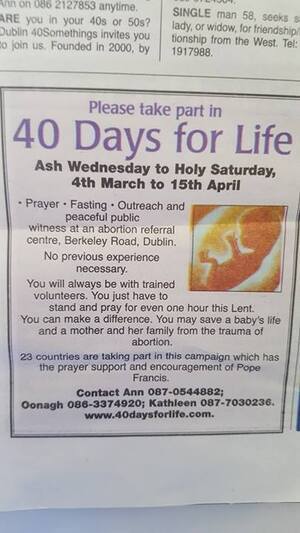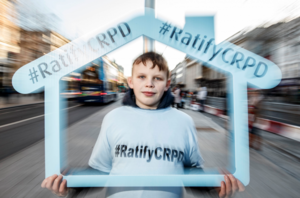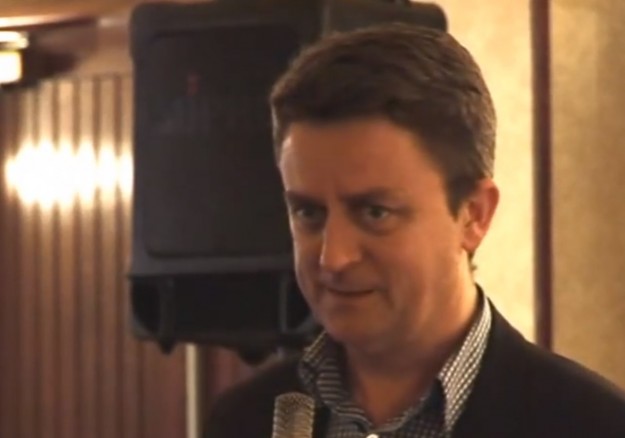Tag Archives: campaign
Dumb F*pps
atSteve Hanlon tweetz:
A new Road Safety Awareness campaign has apparently hit the streets of #Perth in #Australia called “Watch Out for Dumb F**k Cyclists”. Sure to stir a bit of controversy!
Well, yes and no…
Cyclists fall for fake road safety awareness campaign (Mail Online)
On Tour
at#EUsupergirl @Madeleinakay and @FauxBoJo outside the @GuinnessIreland brewery in #Dublin #Ireland with a message for the Irish people: “It’s a lovely day to #StopBrexit!!!” 🇬🇧🇪🇺🍻 #BollockstoBrexitBus pic.twitter.com/fG108M23OO
— BollockstoBrexitBus (@BollocksBus) December 17, 2018
Yikes.
Anyone?
Broad Sheet
atNext step is making this all-female masthead a normal occurrence in the @IrishTimes rather than something that only appears in exceptional circumstances https://t.co/EdMM0tVpNe
— Sorcha Pollak (@SorchaPollak) May 28, 2018
Meanwhile…
Una Mulally, writing last month:
“Why are Irish journalists once again missing a movement? The media at large does appear strangely unable to interpret political movements when they are citizen-driven and formed outside the traditional party political structures.
“The example of how much coverage was given to Renua is an interesting incident of media gravitating towards, and giving credence to, a new political entity just because it was a political party, even though Renua was instantly irrelevant.
Contrast that with how slow the media was to treat with legitimacy the protest movements around water charges, homelessness, marriage equality, transgender issues, reproductive rights, third wave feminism, and so on. Yet it’s the latter that are actually effecting social change.
I have spoken many times about the Irish media’s tendency to be disconnected from the social change that happens from the ground up. I’m sure this point of view annoys many of my colleagues, especially considering journalists are meant to be the ones “in the know”.
“My personal (unpopular) analysis is that while journalists as individuals are made up of all political persuasions and points of view, there is an odd conservatism of thought that permeates the industry.
“…Of course, the maleness of this commentary cannot be ignored. The marriage equality campaign saw a largely heterosexual media comment and patronise an LGBT+ campaign. Now we are seeing a largely male political journalistic class comment on a female-driven campaign. Perhaps if there was greater diversity in the Irish media, we would be getting different analyses.”
FIGHT!
Una Mullally: Why are Irish journalists again missing a movement? (April 16, 2018, The Irish Times)
Pic: Ruadhán Mac Cormaic
Expats For Life twask:
From Paris to New York to Sydney & right around the world, Irish expats are becoming engaged in #8thref & mobilising to help #Savethe8th & defeat #repealthe8th. Many will be coming #hometovote. When will the media cover this instead of the constant #repealthe8th expat stories?
Anyone?
Hahhitude
atBarry Murphy writes:
This ‘Streetwise’ campaign is very victim blamey. Good to see the boys in blue are getting their excuses in early.
One In Seven
atHughie Daly, aged 11, who uses the services of the Rehab Group in Tullamore, helps to launch a campaign calling on the Government to ratify the UN Convention on the Rights of Persons with Disabilities
Martin Grant, of the Rehab Group, writes:
Ireland first signed the UN Convention on the Rights of Persons with Disabilities a decade ago, in March 2007, but have as yet not made it legally binding by failing to ratify it.
Ireland is the only country in Europe not to ratify this vital international agreement, which would afford people with disabilities the same basic human rights as everyone else.
Ireland is also currently on a par with North Korea, Egypt and Ethiopia in not ratifying the CRPD.
Failure to ratify is preventing people from enjoying the everyday freedoms that people without disabilities take for granted, such as the right to choose where to live, the right to appropriate supports to achieve an education and employment, the right to engage in a sexual relationship.
This means one in seven of us are continuing to live with discrimination.
A petition calling for the CRPD to be ratified can be signed here
UPDATE:
In the Dáil on January 17, 2016, People Before Profit TD Gino Kenny raised the matter with the Taoiseach.
They had the following exchange:
Gino Kenny: “When will this country ratify the UN Convention on the Rights of Persons with Disabilities? I have raised this many times with the Minister of State at the Department of Health, Deputy Finian McGrath. It is like waiting for Godot at this stage. People with disabilities and other members of the public are awaiting a decision by this Government. The convention has already been ratified by 156 countries and Ireland must ratify it without further delay. A protest will be held outside the Dáil on Thursday at 12 noon by people with disabilities. People are awaiting a decision and they want it now.”
Enda Kenny: “I thank Deputy Gino Kenny for his good wishes. The relevant Bill was published before Christmas. It is now awaiting Second Stage and will move through the various Stages. The Minister of State, Deputy Finian McGrath, along with many others, has done a lot of work on it. I hope it moves through…”
Gino Kenny: “Is there a specific date?”
Enda Kenny: “I do not know. It will be a matter for the Business Committee to decide when it comes in here in terms of the ordering of business. Obviously, we must follow through with a number of Bills before we can actually ratify the convention but it has moved into a much better place now.”
Gino Kenny: “That is a very poor response.”
Enda Kenny: “I will ask the Minister of State to contact the Deputy directly.”
Transcript via Oireachtas.ie
Taoiseach meets Gerry Adams in Sligo. Brief exchange of pleasantries follows… #GE16 pic.twitter.com/FzO4ytjHbH
— Pat McGrath (@patmcgrath) February 10, 2016
Pat McGrath tweetz:
Like two ships that pass in the night… Taoiseach arrives at Sligo hotel, as Gerry Adams departs…
And later…
Taoiseach meets Gerry Adams in Sligo. Brief exchange of pleasantries follows…
David Quinn Founder of the Iona Institute, outlines the No Campaign’s strategy for May’s Marriage Referendum.
A masterclass in them and ussery.
Stay for the call and response.
David Quinn: “The referendum coming up is one of the most important we’ve ever faced and, actually, it’s connected, to my mind, with any possible abortion referendum.
If we lose this badly, I think they will have an abortion referendum in 2017. If we keep this close, or we manage to win, it’ll frighten them off an abortion referendum for years to come. So I think, actually, this is connected to protecting the 8th amendment of the constitution which is a pro-life amendment.
So the two issues are linked. If they can beat us badly on marriage, they’ll feel they can beat us on the abortion issue. So this is really, really an important battle – not for just what marriage and what the family is all about but for the pro-life section of the constitution, too.”
“Now what’s at stake here? An awful lot of people around the country, at the moment, who are inclined to vote Yes are asking themselves, ‘well, sure what’s the harm? If two nice fellahs who love each other get married, how does that affect me, what’s the harm? what else does it affect?’ And they can’t think of what else it affects, so they’re inclined to vote Yes.
Now that Yes support is actually quite soft. A lot of the opinion polling is showing it’s soft. So there is still a battle to be fought and it’s a battle we can win if we can persuade enough people, actually, there are consequences that haven’t been thought of yet, that haven’t been flagged to people because, as we know, our media are just, almost completely on the side of the Yes campaign.
And we’re essentially hearing propaganda all the time. Marriage equality, yes to equality, yes to love, equal love, all these sort of mantras and soundbites the whole time.
And I mean I go on a few programmes here and there but it doesn’t compare to very soft interviews with gay rights campaigners on the Late Late Show or the Saturday Night Show or the John Murray Show or the Ray D’Arcy Show or whatever the case may be so there’s been almost uninterrupted propaganda for years.
And it’s intensifying at the moment because they’re trying to get as big a lead as they possibly can before the referendum properly begins towards the end of this month.”
“Now, I’ll get into the substance of the issue in a moment but I mean there’s a lot of heart to be taken from this fact: there’s been many referendum campaigns in which the position favoured by what we call official Ireland and Dublin has started out way ahead and has lost, so there’s been EU treaty referendums, where the pro-EU side has started off massively in front and it’s lost.
There was the recent Seanad referendum, started out way in front and lost, the Oireachtas inquiry referendum started way in front and lost and the children’s rights referendum of 2012, I think it was, the end of 2012, with four weeks to go, the Yes side and it was on 74% and the No side was on 4%. There was practically no No side.
There was John Waters and Kathy Sinnott and a few other people. The No side and the children’s rights campaign spent something like €18,000, the Yes side spent over €1million and all the media on their side and yet, on the day itself, within a space of four weeks, the No side went from 4% to 42%.
Now if that can we done, we can do it in this referendum but do, we can do better because a lot more people are energised to support a No side this time than last time. So don’t be depressed by opinion polls.”
[Later]
David Quinn: “The right to marry in our constitution comes with the right to found a family and that means the right to have children. When you give someone the right to marry, now you can’t stop people having children if they want to, and they’re not married and they want to have children, they’re going to have children.
But there’s a legally recognised right to have children when you marry under our constitution. So when you’re giving a right to marry, you’re giving a right to have children also. So when you’re giving a right to men to marry you’re also giving them the right to have children, you’re giving two women the right to have children. Now when you give two men the right to have a child, what is missing from the child’s life?”
Audience: “A mother.”
Quinn: “Precisely. And the converse, if you give two women the right to have a child what’s missing from that child’s life?”
Audience: “A father.”
Quinn: “A father. Now this is simply the most basic facts of life. It’s literally baby stuff in every possible sense of that word because it is completely simple to understand and it is literally about babies. And it’s about mothers and fathers. And it’s about the birds and the bees. So, when we talk about giving people rights, you’ve got to consider, would anybody else’s rights be affected. And conversely, by that, would anybody else’s rights be harmed and taken away?
You see people often say, ‘this is like giving the right of a black person to marry a white person because, in certain American states and in South Africa inter-racial marriage is banned and they try to compare this to that, or they try to say it’s like the American south where they had segregation or South Africa where they had apartheid but when blacks were given equal rights, nobody else’s rights were affected. So it was completely fair and acceptable and defensible.
There was nobody…when a black person could sit anywhere they liked on a bus or use any drink fountain or go to any school or get married to whom they liked, nobody else’s rights were affected – least of all the rights of children. But if you give two men the right to have a child, this comes with the right to marriage, or two women the right to have a child, which comes with the right to marriage, it affects the rights of children.
Because if we believe a child is going to have a mother and father, we cannot possibly countenance same-sex marriage, just can’t do it. And the Government knows perfectly well that this is what’s going on.
The Government knows perfectly well that the change in the article involves the family – we are redefining the family. We are kicking out of the law the notion that a child ought to have a mother and a father because what is recognised by our constitution at the moment is the family of man, woman and child.
And we know that not all married couples have children. But we also know that every child has a mother and father and that’s much more fundamental. And even if every man and woman can’t have a child, if they adopt let’s say, they’ll still give the child a mother and father.
So what we’re really saying in our constitution right now is the family is founded on a union of a man and a woman and if a man and a woman got married, and they have a child, that child will have a married mother and father who’re committed to their welfare – that’s what we’re saying.
It is simply a recognition of basic facts of life. Now I believe in calling different things by different names. The union of a man and a woman is clearly different from the union of a man and a man and should be given a different name. I mean a bike and a car are two modes of transport but you give them different names to give them so you know, you can distinguish between the two different things.
So even if we did allow same sex marriage, it will remain a fact that the union of a man and a woman will still be different and should be called something different. So, what’s going on here actually is, we are being asked to pretend that two different things are the same.
We’re being asked to pretend that the union of two men and two women is the same as the union of a man and a woman when they’re clearly not the same and this is why using words like ‘equality’ is completely misleading.”
Thanks Fluffybiscuits















